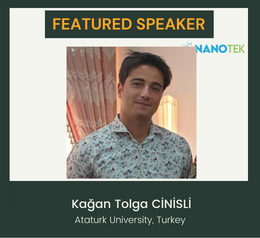Scholars Frontiers in
Nanoscience and Nanotechnology Congress
THEME: "Fostering Advancements in Nanoscience and Nanotechnology"
 27-28 Mar 2023
27-28 Mar 2023  Crowne Plaza Ealing, London, UK & Online
Crowne Plaza Ealing, London, UK & Online THEME: "Fostering Advancements in Nanoscience and Nanotechnology"
 27-28 Mar 2023
27-28 Mar 2023  Crowne Plaza Ealing, London, UK & Online
Crowne Plaza Ealing, London, UK & Online 
Atatürk University, Turkey
Title: Applications of Nanobiotechnology in Agriculture
Dr. Kagan Tolga
CINISLI completed his doctorate at Atatürk University, Department of soil
science and plant nutrition using the concept of nanobiotechnological new
products in agriculture. He have developed new methodological techniques in
agricultural academic studies using nanobiotechnological methods. He observed
that metallic nanoparticles can be effective as a plant nutrient element with
less cost compared to classical fertilizers and with the specific surfaces they
have. The use of nanoparticles together with bacteria that support plant
development may be more effective in agricultural production. Also observed
that some nanoparticles used in combination with bacterial enzymes can be used
as nanobiopesticides.His current field of interest is based on the development
of studies aimed at the inhibition of various agricultural pests under plant
stress conditions or to ensure the transfer of different nanoparticles to the
plant at the cellular level through beneficial microorganisms in the soil and
plant.
Agriculture
faces many challenges arising from abiotic and biotic stress. The application of
high amounts of fertilizers and pesticides has reached a plateau in terms of
improving agricultural production and has caused problems such as environmental
pollution. New approaches that can help maintain plant performance under stress
conditions should be discussed and should not be encouraged. Plant
nanobiotechnology is a currently developing field in agricultural research. It
has shown potential to improve plant performance under biotic stress (e.g.,
pathogens and pests) and abiotic stress (e.g., salinity, drought, and
temperature). This is why nanobiotechnology, or more specifically nanoproducts,
should be used in agriculture. First, nanomaterials (at least one size smaller
than 100 nm; they are not new to nature, including plants. . Nanoparticles
(i.e. CeO 2, SeNP, TiO 2 and AgNP) are known to improve salinity stress
tolerance. Nanomaterials have a larger surface area than the same amount of
bulk material (higher surface area-to-volume ratio and possibly more reaction
area) and may be less toxic to the plant than commercial products. For example,
metal-based engineered nanomaterials such as CuO nanoparticles are generally
less toxic than their ionic counterparts at equivalent doses. For example,
metal-based engineered nanomaterials such as CuO nanoparticles are generally
less toxic than their ionic counterparts at equivalent doses. This effect can
be attributed to the dissolution rate and possibly the reactivity of the
nanoparticles. The concentrations obtained from Zn 2+ dissolved ZnO
nanoparticles are significantly higher for 9 nm particles than for 40 nm
particles. Nano products can be used as an auxiliary component to improve the
efficiency of commercial products. Compared to the limits on their commercial
counterparts (mostly in chemical form), nanoparticles are to offer numerous
possibilities for functionalizing nanoparticles with engineered properties,
allowing researchers to perform easy surface conjugation. This makes it
possible to design and optimize nanoparticles to address problems in plant
science and agriculture in real time and in a more efficient way compared to
traditional methods for discovering new chemicals. Engineered nanomaterials can
be proposed as ideal platforms to lead the agricultural technology revolution.